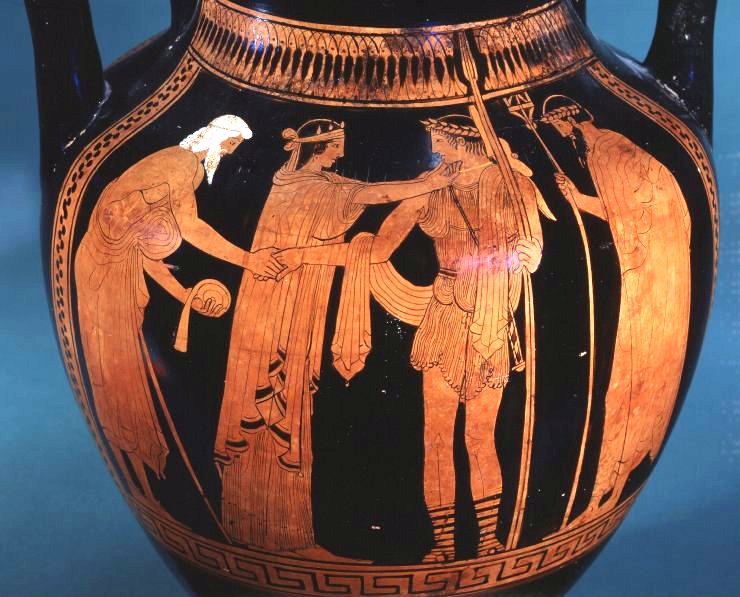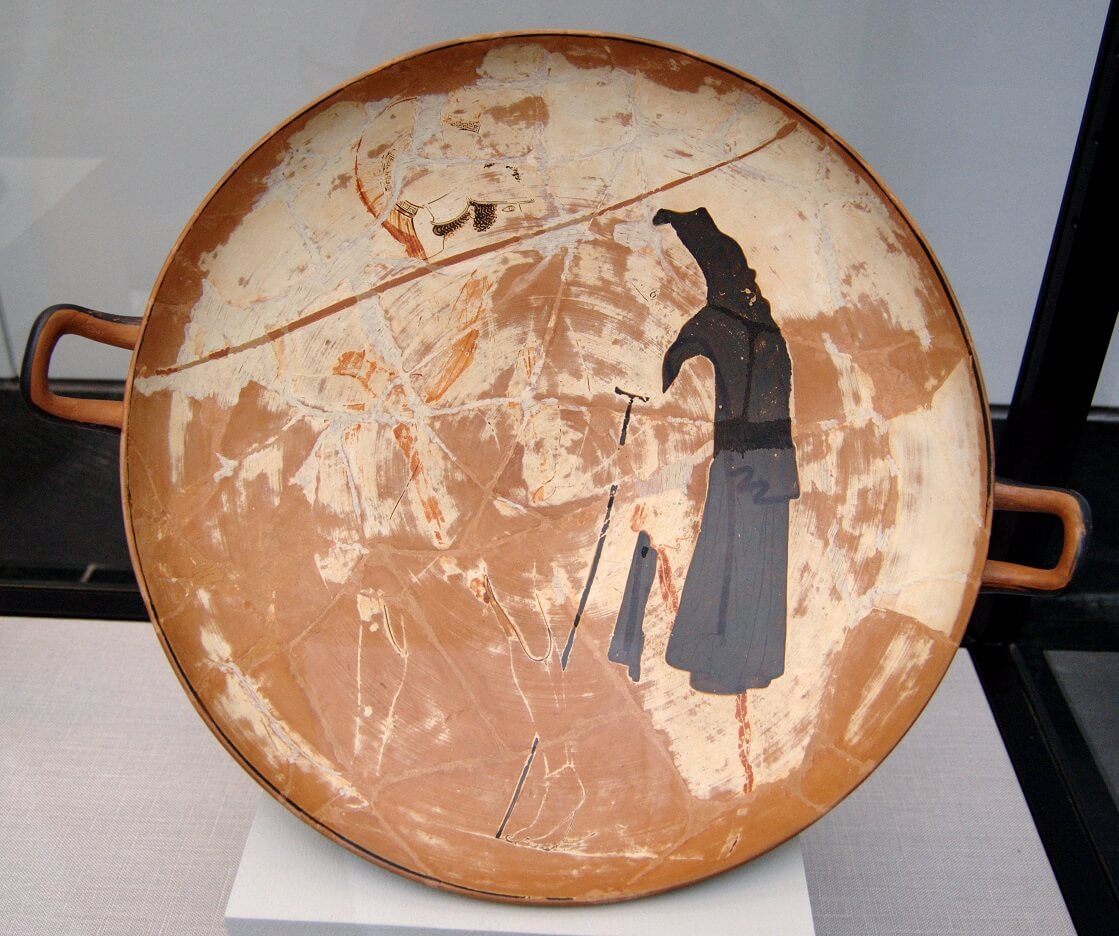Aethra
In Greek mythology, Aethra or Aithra (Ancient Greek: Αἴθρα, meaning: the "bright sky") was a daughter of King Pittheus of Troezen and the mother of Theseus (his father was King Aegeus of Athens, or in some versions, Poseidon) and of Clymene (by Hippalces). Aethra was also called Pittheis after her father Pittheus.
Mythology
The first to come for Aethra's hand was the famous hero Bellerophon who came to Troezen to ask Aethra's father, Pittheus, for the maiden's hand in marriage, but the hero was banished from Corinth before the nuptials took place.
King Aegeus who was childless with his previous marriages went to Troezen, a city southwest of Athens that had as its patrons Athena and Poseidon. Here Pittheus got Aegeus drunk on unmixed wine and put him to bed with his daughter.
Following the instructions of Athena in a dream, she left the sleeping Aegeus and waded across to the island of Sphairia that lay close to Troezen's shore. There she poured a libation to Sphairos, Pelops' charioteer, and was raped by Poseidon in the night. Aethra was therefore impregnated by both Aegeus and Poseidon in the process.
According to Plutarch, her father spread this report merely that Theseus might be regarded as the son of Poseidon, who was much revered at Troezen. This opinion, however, is nothing else but an attempt to strip the genuine story of its marvels.
Aethra, later on dedicated in the island of Sphairia a temple to Athena Apaturia (the Deceitful), and called the island Hiera instead of Sphaeria, and also introduced among the maidens of Troezen the custom of dedicating their girdles to Athena Apaturia on the day of their marriage.
At a later time, when Aethra was thus doubly pregnant, Aegeus decided to go back to Athens. Before leaving, he covered his sandals, shield and sword under a huge rock, that served as a primitive altar to Strong Zeus, and told her that when their son would grow up, he should move the rock and bring his weapons back.
Aethra did as she was told, and Theseus, recovering the weapons that were his birthright, grew to be a great hero, killing the Minotaur, among other adventures.

Years later, and at some point, Aethra followed her son to Attica, for Theseus’ mother is next mentioned years later, when Theseus is seeking a new wife, after the death of Phaedra. Theseus and Pirithous decide that they are deserving to wed daughters of Zeus, and so the pair head to Sparta, for Theseus has set his heart on marrying the young Helen, daughter of Zeus and Leda.
The abduction of Helen by Theseus was an easy affair, for she was taken whilst dancing in the temple of Artemis, and Theseus managed to return unmolested to Attica. There he left Helen in the care of Aethra, hidden away in the city of Aphidnae, one of the 12 ancient towns of Attica. Theseus and Pirithous then descended into the Underworld to make Persephone Pirithous’ wife.
The abduction of Helen didn’t go unnoticed and soon Castor and Pollox, the heroic brothers of Helen, were leading a Spartan army to Athens.
Arriving at Athens, Castor and Pollox (the famous Dioscuri) demanded the return of Helen, but of course the Athenian elders could not do so, because she was not in Athens, and believing the Athenians were lying, Castor and Pollox declared war upon them.
Eventually, it was revealed that Helen was in Aphidnae, and that town easily fell to the Spartans. Helen was retrieved and Aethra was taken as a captive, becoming the handmaid of the Helen.
The absence of Theseus and the war with Sparta led to Theseus losing the throne of Athens to Menestheus, and shortly after his return from the Underworld, Theseus would die upon Scyros.
For many years, Aethra would remain as a servant of Helen, and when Helen was later taken by the Trojan prince Paris, and transported to Troy, Aethra went with her mistress. Throughout the Trojan War Aethra was found alongside Helen.
When the war ended and Helen was taken back to the Achaean camp, Aethra was recognised by Demophon and Acamas, her grandsons, born to Theseus and Phaedra. Demophon went to the commander of the Achaean force, Agamemnon, and asked that Aethra be released from servitude. Agamemnon asked his sister-in-law Helen to give up Aethra, and this Helen did, so for the first time in many years Aethra was a free woman again.
Aethra probably returned with Demophon to Athens, and Demophon succeeded Menestheus as king of Athens.
Aethra possibly died of old age in Athens, although some tell of committing suicide when both Demophon and Acamas died in accidents soon after the end of the Trojan War.

Sources
Robert Graves, The Greek Myths, (1955; 1960) index, s.v. "Aethra".
Scholia on Iliad, 3. 144; Dictys Cretensis. Journal of the Trojan War, Book 6.2
Ovid. Heroides, 10.31.
Pausanias. Description of Greece, 2.31.12
Plutarch. Theseus, 3; Hyginus. Fabulae, 14
Pseudo-Apollodorus. Bibliotheca, 3.15.7; Hyginus. Fabulae, 37; Bacchylides. Dithyrambs, 3.34
Plutarch. Theseus, 6
Pausanias. Description of Greece, 2.33.11
Plutarch. Theseus, 34; Homer. Iliad, 3.144; Dio Chrysostom. Speeches, 11.59
Pausanias. Description of Greece, 10.25.3; Dictys Cretensis. Journal of the Trojan War, 5.13
Hyginus. Fabulae, 243
Pausanias. Description of Greece, 4.19.1; Dion Chrysostom. Orations, 11
Pausanias. Description of Greece, 10.25.2.
William Smith. A Dictionary of Greek and Roman biography and mythology. London (1848)
"Wikipedia"













